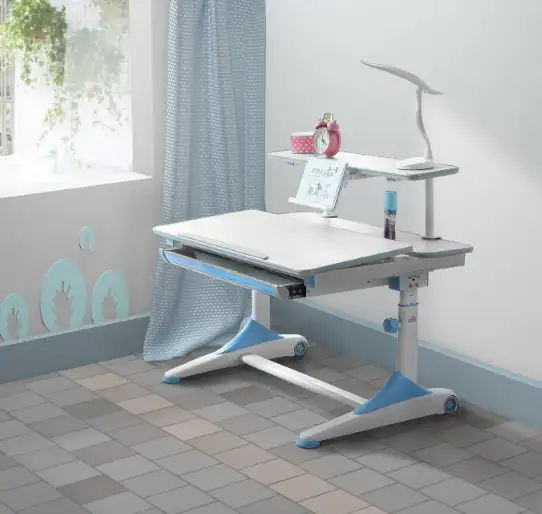Study Table is the Root Garden for Kids

In every home that nurtures a growing child, there’s often one unassuming piece of furniture that silently shapes the future—the study table. More than just a flat surface with drawers, a study table is where imagination takes form, curiosity flourishes, and dreams take root. In a poetic sense, it is the root garden of a child’s intellectual and emotional development—a place where the seeds of learning are sown and nourished daily.

The Symbolism of the Root Garden
A root garden is hidden beneath the surface, quiet yet powerful. It is the base from which plants draw strength, nourishment, and stability. Likewise, a child’s study table is not just a place to do homework—it’s where the child cultivates discipline, focus, creativity, and knowledge. The growth may not always be visible, but it is steady and foundational. Over time, like roots turning into strong trunks and branches, study-time rituals shape the child's personality, values, and future choices.
Creating a Learning Environment
A child’s surroundings deeply affect their behavior and mindset. A dedicated study table provides a structured space—an environment that signals to the brain: “Now it’s time to focus.” Unlike a couch or a dining table that serves multiple purposes, a study table becomes a personal zone for concentration and creativity.
When equipped with the right tools—books, stationery, a pinboard for goals, maybe a globe or an inspiring quote—the study table becomes a vibrant learning ecosystem. Just like different plants in a root garden need specific nutrients, children thrive when their study area is tailored to their interests and learning style.
Building Habits and Discipline
Routine is essential for children, and having a designated study table helps in establishing good study habits. The daily act of sitting down, organizing materials, and dedicating time to learning builds a sense of discipline that extends beyond academics.
Over time, children begin to associate their table not just with homework, but with the joy of learning—reading a new story, drawing something creative, solving puzzles, or writing in a journal. These consistent routines cultivate intrinsic motivation. Like roots learning to spread and dig deeper, kids learn to push themselves, organize their thoughts, and stay committed to goals.
A Space for Exploration and Expression
Children are naturally curious. Their study table is the canvas on which they explore the world. One day they’re writing about astronauts, the next they’re painting a treehouse, or researching dinosaurs. This freedom to explore ideas in their own space helps them build confidence in expressing themselves.
For some, it’s a sanctuary to process emotions by writing a story or drawing feelings. For others, it’s a workshop to build mini science experiments or practice math problems. The study table becomes a gateway to self-discovery, allowing kids to understand not just subjects, but their own learning style, passions, and pace.
Encouraging Independence
Just as plants grow best when allowed to reach toward the sun on their own, children thrive when given independence. A well-organized study table teaches them responsibility. They learn to manage their time, keep their space tidy, and take ownership of their learning.
Rather than being constantly monitored, children at their own study table feel a sense of ownership and autonomy. These feelings are essential for developing problem-solving skills, confidence, and decision-making abilities. They learn that mistakes made at their desk are stepping stones to understanding—a crucial life lesson.
Digital Age and the Role of the Study Table
However, the presence of technology requires thoughtful boundaries. A study table can help maintain a balance between screen time and active learning. By setting up rules—for instance, keeping phones away during reading time or using educational apps in moderation—parents can guide children toward mindful digital usage.
Parent Involvement and Bonding
The study table can also become a point of connection between parents and children. Sitting together for a few minutes to help with homework or talk about their day’s learning builds trust and shows that learning is a shared journey. These moments, though small, are deeply nurturing—like water drops that sustain roots.
Parents can also help personalize the space with their children—choosing a colorful lamp, adding a “wall of fame” for good grades or drawings, or even planting a real mini garden beside the table to reinforce the “root garden” metaphor in real life.
From Roots to Wings
What begins as a small desk for coloring books might evolve into a workstation for coding, writing, or preparing for exams. The continuity of having a familiar yet evolving space supports their transition from playful learners to independent thinkers.
Like roots anchoring a tree, the study table grounds children in the values of perseverance, focus, and creativity. And from that strong base, they grow wings to fly toward their dreams.
Tips to Turn a Study Table into a Root Garden
- Personalize the space: Let kids add their favorite colors, stickers, or inspirational quotes.
- Keep it organized: Use drawers, bins, and shelves to manage clutter.
- Add a touch of nature: A small plant can make the space calming and inviting.
- Rotate learning materials: Keep curiosity alive by rotating books or learning games.
- Avoid distractions: Keep the area free from TV, snacks, or unrelated gadgets.
- Encourage regular breaks: Just like plants need sunshine and water, children need breaks to refresh their mind.
Conclusion
Study table is the root garden for kids? The study table is more than furniture - it’s a seedbed of potential, a root garden where the future is quietly taking shape. Every scribble, question, and aha moment nurtured at that table adds to a child’s intellectual and emotional growth. In a world that’s always rushing forward, a simple, stable study table reminds us that growth begins at the roots. So let us tend to these root gardens with care, love, and vision - for they hold the promise of tomorrow’s thinkers, creators, and leaders.
User Replies
New Updates

How to Calculate Inflation
Understanding how to calculate inflation empowers you to mak...

Understanding Loan Application Fee Refunds
Applying for a loan, whether it’s for a new home, a car, or...

RBI Retail Direct Scheme Online Portal
The RBI Retail Direct Scheme enables individual investors bo...

Cyber Crime Complaint Letter Format - Hindi and English Sample
This blog post explains how to draft a cyber crime complaint...

How to File a Cyber Crime Complaint?
Cybercrime is rising fast in India, affecting individuals an...
Recent Topics

Welcome Back
Sign in to My Website v2